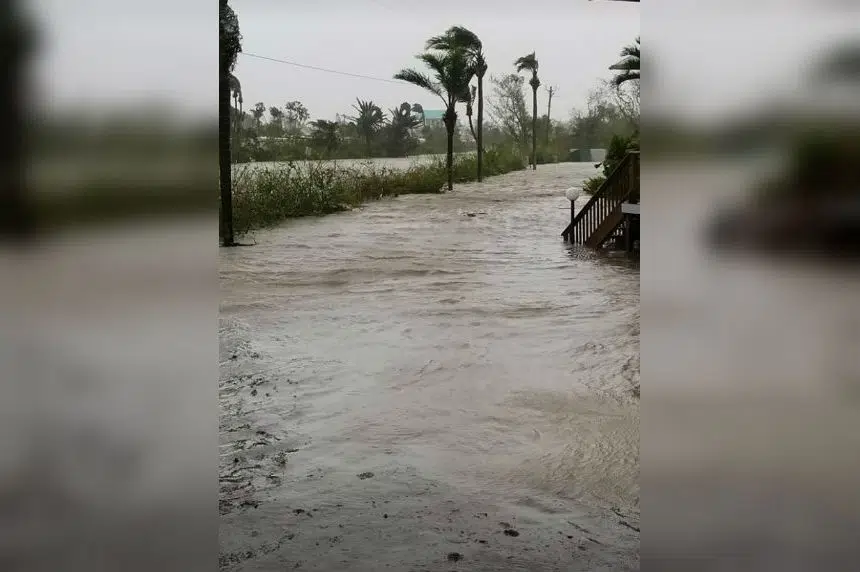Just as Hurricane Irma began to storm through southern Florida this weekend, Outlook’s Bob Utigaard headed for higher ground.
Utigaard flew down to the Sunshine State to check on his RV and boat housed on Chokoloskee Island, just 64 kilometres southeast of Naples, Fla., Thursday night.
As soon as he touched down, Utigaard immediately booked a flight out for Saturday at 10:50 a.m., which — according to him — became the last one out of Fort Myers, Fla. through Delta airlines.
When he was driving to his oceanfront property around 11 p.m. Thursday, Utigaard said — despite the calm weather — people were scrambling, most of them trying to find enough wood to board up their homes and shops.

A surf shop in Naples, Fla. boarded up its windows before people evacuated the community Sept. 8, 2017. (Submitted by Bob Utigaard)
“You could see vehicles driving down the road with truck loads of lumber; they had their hazard lights on,” described Utigaard.
Aside from the lumber shortages, he said residents were ultimately concerned about getting enough water and fuel before the mandatory evacuation order started to kick in Saturday morning.
People were trying to grab what they could, thinking it would only be a 12- to 24-hour evacuation period, but it has since extended into almost a week.
Those who left early on took the essentials — their pets, cell phones, life jackets and important documents.
As for those who didn’t head to safety right away, Utigaard said they were able to take a bit more with them.
“(People) were pushing shopping carts full of groceries, clothing, personal hygiene products and, you know, just enough food and water to get by for four to five days,” he explained.
At 6 a.m. on Saturday, as evacuees headed to nearby schools and government buildings to take shelter, Utigaard said he went straight to the airport.
He described the atmosphere at the Southwest Florida International Airport as chaotic and packed with around 5,000 people — all of whom were trying to get standby flights.
“There were so many questions in the air; people didn’t know what to think. We didn’t know if our flight was going to take off — what if the flight happened to be cancelled, then where do we go? Then what do we do?” Utigaard explained, adding that the hurricane shelters were filling up quickly and many were getting nervous.
Once he boarded his plane to Atlanta, Ga. to catch his connecting flight back to Canada, Utigaard said he felt a wave of relief, but that soon shifted to feelings of anxiousness for the friends he had left behind in Florida.
“I was able to get out safe and secure, and there were other people who probably had that option — leaving earlier — but procrastinated,” he explained. “People want to believe that (Hurricane Irma) is not going to be as bad as it is.”
When Irma is over and he returns for the cleanup efforts in about a week, Utigaard said he predicts homes will be mostly intact as they’re built to withstand hurricanes, but smaller buildings, like garden sheds, will leave behind a disaster.
“We will come back to just floating debris, lumber, lawn chairs, batteries — anything that people put in storage in their garden sheds,” he said.
Watching Hurricane Irma from his home in small town Saskatchewan, Utigaard said there’s nothing he can do but wait it out.
“You can’t fight Mother Nature, it’s a fact of life,” he said. “If you’re going to live in southern Florida … you are going to take your chances with the hurricanes.”







